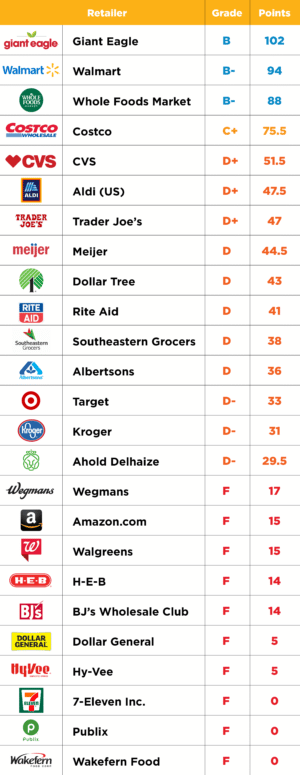New Scorecard Reveals Half of Major U.S. Food Retailers Have Pesticide Policies but Progress Falls Short to Protect Bees and Biodiversity
CVS and Southeastern Grocers are latest to join leaders on Bee-Friendly Retailer ScorecardWASHINGTON DC – Friends of the Earth today released its latest Bee-Friendly Retailer Scorecard, ranking 25 of the largest U.S. grocery retailers on pesticides and pollinator protection in their food and beverage supply chains. Two companies, CVS (NYSE: CVS) and Southeastern Grocers established new policies this year that encourage suppliers to eliminate or reduce the use of key toxic pesticides that harm pollinators and other beneficial insects that are critical to our food security — neonicotinoids, organophosphates and glyphosate. This makes twelve companies in total since 2018, half of those graded on the scorecard.
Yet, despite important momentum across the sector, action falls far short of what is needed to protect bees and other biodiversity from toxic pesticides. Giant Eagle is the only major U.S. food retailer to make a timebound commitment to eliminate key pesticides of concern in part of its supply chain. According to the company’s policy, it will eliminate the use of nitroguanidine neonicotinoids — banned in the EU since 2018 but still allowed in the U.S. — from its produce supply chain by 2025. Research shows that U.S. agriculture has become 48 times more toxic to bees and other beneficial insects since neonicotinoids were introduced in the 1990s.
“Grocery stores will feel the sting of widespread pesticide use in their supply chains if they don’t take action immediately,” said Kendra Klein, senior scientist at Friends of the Earth. “From the decimation of pollinator populations to the devastation of soil life, reducing pesticide use is a key solution to the biodiversity and climate crises that threaten our food supply. We call on food retailers to lead the way.”

In the Scorecard, companies were also evaluated based on organic offerings. Research shows that organic farming can help reverse pollinator declines and can support up to 50% more pollinating species than conventional agriculture. Only two companies — Whole Foods and Trader Joe’s — have met Friends of the Earth’s ask to expand organic offerings to 15% of overall sales by 2025.
Pollinators are a cornerstone to a dependable food supply, contributing approximately $34 billion to the U.S. economy and up to $577 billion to the global economy annually. Without pollinators, grocery stores would run short of many fruits and vegetables, nuts, beans and treats like chocolate and coffee. And because bees pollinate alfalfa and other feed crops eaten by cows, even the dairy and meat shelves would look bare. Research indicates that pollinator loss has already resulted in decreased production of crops like apples and cherries.
Food companies should recognize reduction of toxic pesticides as a critical way to achieve the biodiversity, climate, health and labor protection goals advanced by their ESG (environmental and social governance) programs. Addressing pesticides is also important to meeting consumer expectations — 74% of Americans believe grocery stores should support efforts to protect pollinators according to recent polling from YouGov commissioned by Friends of the Earth. Additionally, 83% of customers believe it is important to eliminate pesticides that are harmful to pollinators from agriculture.
While agriculture accounts for the vast majority of pesticide use, the scorecard also awarded points to twelve companies for complementary policies in their home and garden supply chains, including credit to Dollar Tree (NASDAQ: DLTR) for ending sales of neonicotinoid and glyphosate products for outdoor use, joining six other companies that have already done so.
All of these retailer commitments follow a multi-year effort led by Friends of the Earth and allies that aims to address the use of toxic pesticides in the food system. The same pesticides that threaten pollinators also harm human health, including the farmworkers and rural communities on the frontlines of exposure. And these same chemicals threaten the soil life that is needed to build healthy soils that sequester more carbon, enhance farmers’ resilience to climate change, and conserve water.
The campaign is supported by over 100 beekeeping, farming, farmworker, consumer and environmental organizations, including Campaign for Healthier Solutions, which works with the dollar stores on phasing out harmful chemicals.
Expert contact: Kendra Klein, PhD, (415) 350-5957, [email protected]
Communications contact: Haven Bourque, (415) 505-3473, [email protected]
